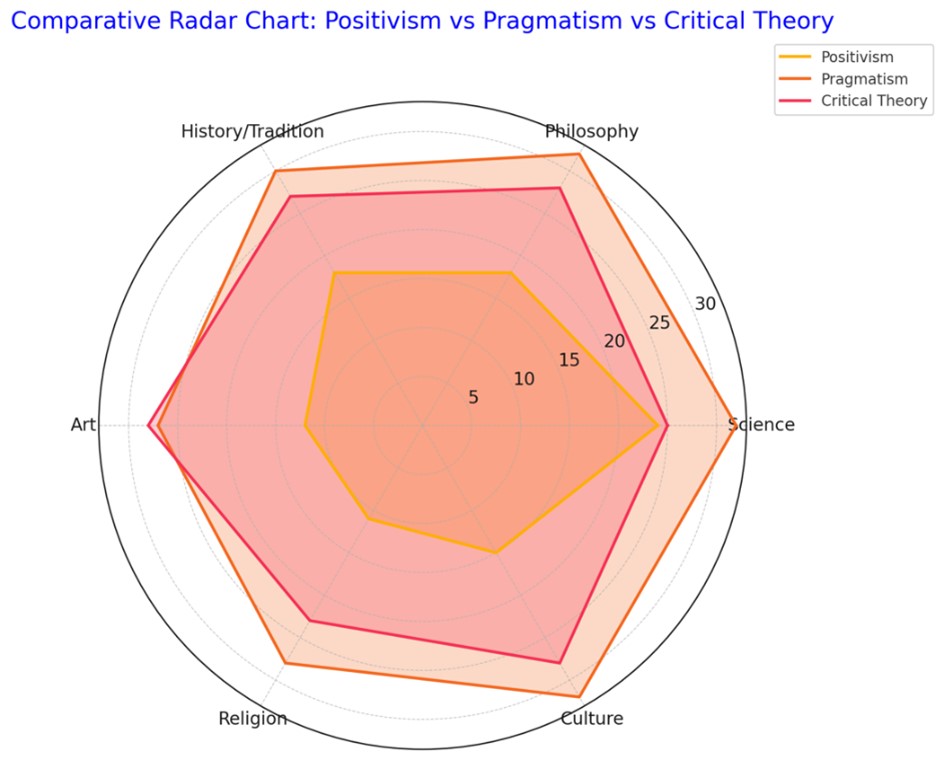A Comparative Analysis of Twelve Research Paradigms Across Six Knowledge Acquisitions and Twelve Sources of Knowledge: A Philosophical Discourse
Abstract
This study investigates whether a single research paradigm can dominate knowledge acquisition across empirical and interpretive domains or if a multi-paradigm approach is essential for achieving a holistic understanding. Twelve paradigms, including Positivism, Pragmatism, Hermeneutics, and Feminism, were evaluated across six domains: Science, Philosophy, History, Art, Religion, and Culture. The methodology employed comparative analysis, factor analysis, sensitivity testing, and inter-rater reliability assessment to quantify paradigm performance. The findings confirm Positivism's strength in empirical fields like Science and Philosophy but reveal its limitations in addressing ethical, cultural, and interpretive dimensions, where paradigms like Hermeneutics and Feminism excel. Pragmatism and Critical Realism bridge empirical rigor with interpretive depth, offering integrative solutions for interdisciplinary challenges. By applying statistical tools within a philosophical inquiry, this research highlights the necessity of humility and open-mindedness in selecting paradigms to address complex questions. The study concludes that no single paradigm suffices across all domains, advocating for a multi-paradigm approach to foster collaboration, inclusivity, and a more comprehensive understanding of knowledge production. These insights have implications for interdisciplinary research, education, and policymaking, emphasizing the importance of integrating diverse epistemological perspectives.
References
Bhaskar, R. (1975). A Realist Theory of Science. Leeds Books.
Bhaskar, R., Danermark, B., & Price, L. (2017). Critical Realism and Social Science. https://doi.org/10.4324/9781315177298-5
Bryman, A. (2012). Social Research Methods (4th ed.). Oxford University Press.
Creswell, J. W., & Plano Clark, V. L. (2018). Designing and Conducting Mixed Methods Research (3rd ed.). SAGE Publications, Inc.
Gadamer, H. G. (1989). Truth and Method. Continuum.
Gaut, B. (2020). A Philosophy of Art: The Metaphysical Foundations. Cambridge University Press.
Guba, E. G., & Lincoln, Y. S. (1994). Competing paradigms in qualitative research. In Handbook of qualitative research (pp. 105-117). SAGE.
Haack, S. (2018). Evidence Matters: Science, Proof, and Truth in the Law. Cambridge University Press.
Ibarra, A., & Mormann, T. (2006). Scientific Theories as Intervening Representations. Theoria an International Journal for Theory History and Foundations of Science. https://doi.org/10.1387/theoria.551
Johansson, L. G. (2016). Philosophy of Science for Scientists. https://doi.org/10.1007/978-3-319-26551-3
Kim, Y. (2024). Application of Social Constructivism in Medical Education. Korean Medical Education Review. https://doi.org/10.17496/kmer.23.044
Mertens, D. M. (2005). Research and Evaluation in Education and Psychology: Integrating Diversity With Quantitative, Qualitative, and Mixed Methods. SAGE Publications.
Morgan, D. L. (2014). Pragmatism as a Paradigm for Social Research. Qualitative Inquiry, 20(8), 1045-1053. https://doi.org/10.1177/1077800413513733
Piaget, J. (1977). The Development of Thought: Equilibration of Cognitive Structures. Viking.
Saunders, M. N., Lewis, P., & Thornhill, A. (2023). Reseach Methods for Business Students (9th ed.). Pearson Education Limited.
Schwandt, T. A. (2000). The SAGE Dictionary of Qualitative Inquiry. SAGE Publications, Inc.
Schwartz-Shea, P., & Yanow, D. (2012). Interpretive Research Design: Concepts and Processes (Illustrated). Taylor & Francis. https://doi.org/10.4324/9780203854907
Sharp, E. A., Aguirre, G., & Kick, E. L. (2011). Positivist and post-positivist approaches to interdisciplinary research: A critical review. Theory and Practice in Interdisciplinary Research, 7(1), 12-26.
Sharp, L., McDonald, A., Sim, P., Knamiller, C., Sefton, C. J., & Wong, S. (2011). Positivism, Post‐positivism and Domestic Water Demand: Interrelating Science Across the Paradigmatic Divide. In Transactions of the Institute of British Geographers https://doi.org/10.1111/j.1475-5661.2011.00435.x
Swinburne, R. (2004). The Existence of God. Oxford University Press. https://doi.org/10.1093/acprof:oso/9780199271672.001.0001
Toronata Tambun, A. R. Y., Yudoko, G., & Aldianto, L. (2024). Qual-Quant-Quant/Qual-Qual Mixed Method: Autoethnography in Building System Dynamics’ Causal Loop Diagram [Manuscript submitted for publication]. International Journal of Multiple Research Approaches.
Vygotsky, L. (1978). Mind in Society: The Development of Higher Psychological Processes. Harvard University Press.


This work is licensed under a Creative Commons Attribution 4.0 International License.
Copyright for this article is retained by the author(s), with first publication rights granted to the journal.
This is an open-access article distributed under the terms and conditions of the Creative Commons Attribution license (http://creativecommons.org/licenses/by/4.0/).









1.png)














